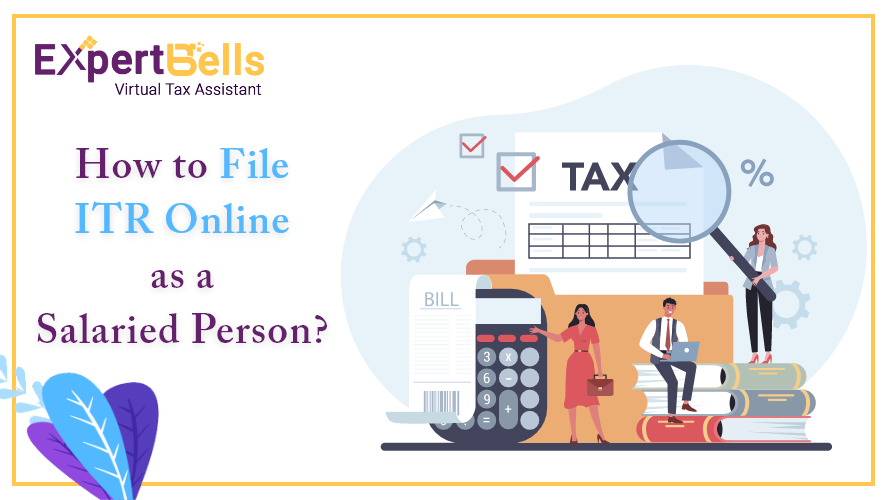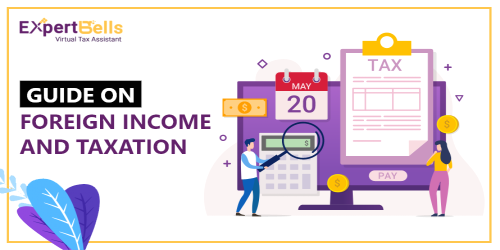How to File ITR Online as a Salaried Person?

When it comes to filing income tax returns (ITR), the question on most taxpayer's minds is "How to file an income tax return for salaried individuals. In this informative post, we are going to tell you how to file your tax return online if you are a salaried person. When you are a salaried employee, the main source of your income is salary, and you may have interest income from the bank.
What is Income Tax Return (ITR)?
ITR (Income Tax Return) is a document that needs to be filled by every taxpayer with the tax authority every financial year. Income tax return contains the complete details of income sources and the tax liability on them. We have 7 different types of ITR forms such as ITR1, ITR 2, etc. Remember, the applicability of these forms depend on a variety of factors like the amount of income and income sources.
Benefits of filling your ITR on time
- Filing your tax return regularly means you have a regular income and you have paid your taxes on it. It will help you get loans from the bank easily.
- You can claim deductions under different sections of income act if you have filed your income tax return on time every year.
- Filing your tax return on time means you are eligible for a refund and can claim it.
- People who are applying for a Visa, then the overseas consulate would need proof of your income and income tax receipts are needed.
- If you file your ITR regularly, you can carry forward any capital loss for the next 8 consecutive financial years in case you have such losses.
What ITR Forms are applicable for a salaried person?
The Income Tax Return for individuals depends on their income as well as the category of taxpayers which they belong to. The forms which are relevant to a salaried person are ITR1 and ITR2.
ITR1: it is also known as SAHAJ form and needs to be filled by working taxpayers whose total yearly income doesn't exceed Rs. 50 lakh. Any person whose income from agriculture does not exceed Rs. 5000 or who has a one house property also needs to submit ITR1.
ITR2: This form is for those whose income is above Rs. 50 lakh. Also, the income source can involve income from capital gains or even the agricultural income can exceed Rs. 5000. If you have made an investment in unlisted equity shares, then you have to file ITR2.
How to file your income tax return online?
There are two ways for ITR filing online in India.
- Download the ITR preparation software and prepare the return using the downloaded software and later generate the XML and then upload it.
- Directly enter all your details in an online form and submit it. Keep in mind, the second method is available only for ITR1 and ITR4 so that if you are a salaried employee then you can use it. Filing ITR online is a better option than the first one, if you need my personal opinion. If you still facing any issue in ITR filing in Delhi, then our professional team will happy to assist you.
Steps of filing ITR Online:
Step1: Login to e-filing web portal with your user id, password, date of birth or date of incorporation and captcha.
Step 2: Go to the e-file and click on "prepare and submit ITR online".
Step 3: Now select the ITR form (ITR1 or ITR4s) and the assessment year like 2019-20.
Step 4: Now Fill all your details and click on the submit button.
Step 5: Now upload your Digital signature certificate or DSC if applicable. Ensure the DSC is registered with e-filing. Click on the submit button.
Step 6: ITR-V would be displayed if the digital signature certificate is not used on successful submission. Now click on the link (send to your registered email id) and download the ITR v. If ITR is uploaded with DSC, the tax return filing process online is done.
Step 7: In case the tax return is not uploaded with DSC, then you can print the ITR-v form and sign and submit it to CPC within 120 days from the date of e-filing.
Step 8: The tax return will be processed upon the receipt of the signed ITR-V, so check your email or sms for reminders on non-receipt.
Step 9: The process of preparing and submitting the income tax return online is completed.
Documents required for filing ITR online for salaried employees
There are six important documents required for Income tax return filing for individuals. They are PAN/ TAN application card, Bank account details, form 16, Aadhar card, investment details and form 26AS.
What are the checklists of income tax filing online for salaried employees?
When you are filing ITR online, you need accurate information on your income, taxes and deductions. Let's take a look at the checklist when e-filing your income tax return.
- The most vital document which your employer will provide you is form 16.
- People who are salaried employees and do not have income from any other sources have to fill up ITR 1 when filing tax returns online.
- Form 26AS is a consolidated record of a variety of taxes deducted from the income and deposited with the concerned authority.
- For saving bank account and FD interest, you need a few documents such as a passbook for interest on your savings account, keep ready of all your bank details with IFSC code, interest certificates or TDS filing return certificates from post offices and banks.
According to income tax law, people who earn a specified amount of income every year have to file a tax return on that amount within the due date. Filing your income tax return is a sign that you have paid the tax payable and that you are a loyal and responsible citizen of India.
If you need any information or help regarding ITR filing in India, contact ExpertBells now.
Related Articles

Deferred Tax- Tax Effect of Temporary Differences
Deferred tax is the tax for those items which are accounted in Profit & Loss A/c but not accounted in taxable income which may be accounted in taxable income in future & vice versa. It shall either be paid or has already been settled due to momentary inconsistency between an organization’s income statement and tax statement. The word Deferred has been derived from the word “Deferments” which means setting out for something to happen at a future date.

How to Save Income Tax on Salary Income
As soon as the Assessment year comes, the salaried class gets agitated about their tax returns. For you it is foremost to understand the tax slab and what is the meaning of each of your salary breakup component. By acknowledging this, you can figure out how to save tax. Let us understand about your salary components and how you can save tax on your salary income point by point.

SECTION 194Q OF THE INCOME TAX ACT 1961-TDS ON PURCHASE OF GOODS
Any person, being a buyer who is responsible for paying any sum to Seller for purchase of any goods of the value or aggregate of such value exceeding fifty lakh rupees in any previous year, shall, at the time of credit of such sum to the account of the seller or at the time of payment thereof by any mode, whichever is earlier, deduct an amount equal to 0.1 per cent. of such sum exceeding fifty lakh rupees as income-tax
Leave A Reply
Your email address will not be published. Required fields are marked *
Most Popular Blogs


What is a Mentor? Definition, Purpose & More

Difference Between Mentor and Mentee

How To Find A Business Mentor: A Complete Guide



5 Comments
Lorem Ipsum is simply dummy text of the printing and typesetting industry. Lorem Ipsum has been the industry's standard dummy text ever since the 1500s, when an unknown printer took a galley of type and scrambled it to make a type specimen book. It has survived not only five centuries, but also the leap into electronic typesetting, remaining essentially unchanged. It was popularised in the 1960s with the release of Letraset sheets containing Lorem Ipsum passages, and more recently with desktop publishing software like Aldus PageMaker including versions of Lorem Ipsum.
Lorem Ipsum is simply dummy text of the printing and typesetting industry. Lorem Ipsum has been the industry's standard dummy text ever since the 1500s, when an unknown printer took a galley of type and scrambled it to make a type specimen book. It has survived not only five centuries, but also the leap into electronic typesetting, remaining essentially unchanged. It was popularised in the 1960s with the release of Letraset sheets containing Lorem Ipsum passages, and more recently with desktop publishing software like Aldus PageMaker including versions of Lorem Ipsum.
Lorem Ipsum is simply dummy text of the printing and typesetting industry. Lorem Ipsum has been the industry's standard dummy text ever since the 1500s, when an unknown printer took a galley of type and scrambled it to make a type specimen book. It has survived not only five centuries, but also the leap into electronic typesetting, remaining essentially unchanged. It was popularised in the 1960s with the release of Letraset sheets containing Lorem Ipsum passages, and more recently with desktop publishing software like Aldus PageMaker including versions of Lorem Ipsum.